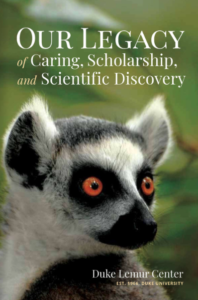The time is now.
When you meet a lemur, you just know — there’s something special about these ancient primate cousins of ours.
Maybe you fell for our charismatic sifakas, gentle-but-misunderstood aye-ayes, or impish ruffed lemur twins – so crucial to the survival of their species – while touring the DLC. Or you were compelled by a story you read about how the DLC’s lemurs play a critical role in non-invasive research studies, including those that shed light on devastating human diseases like Alzheimer’s. Or perhaps you care deeply about conservation and perceive the urgency of working with Malagasy communities to preserve the beauty and biodiversity of Madagascar – the world’s most iconic biodiversity hotspot.
Regardless of what led you here, you’re in the right place to make a difference.
We can’t do it without people like you.
The Duke Lemur Center is funded by three main sources: Duke University, tour revenue, and private donations and grants.
Your donation makes it possible to provide the food, housing, equipment, and veterinary support necessary to care for our irreplaceable colony each and every day.
In addition, private donations and grants fund 100% of the Lemur Center’s conservation efforts in Madagascar, where we work with local communities to save and protect wild lemurs and their natural habitat.
To learn more about the DLC’s 56-year legacy and the impact of your investment, browse the online versions of our annual impact reports. A heartfelt THANK YOU for your support — we couldn’t do this work without you!
Why are lemurs important?
Lemurs aren’t just rare; they’re the most endangered group of mammals on Earth. One third of lemur species have gone extinct, and many more teeter on the brink of extinction.
Like humans, lemurs are primates. In fact, lemurs and other prosimians like bush babies and lorises are the most ancestral primates and evolved long before monkeys and apes. By studying these early representatives of the primate family tree, we gain tremendous insight into primate evolution. And because we share with lemurs the vast majority of our genetic code and many of the same diseases, susceptibilities, and health concerns, studying lemurs could potentially help us find solutions to combat serious problems facing modern society.
What does your gift provide?
Facilities and Care
A one-of-a-kind place: Private donations help us run and maintain our 100-acre grounds, indoor housing facilities, fencing, and natural habitat enclosures (NHEs). NHEs not only enrich the animals, but also provide researchers the opportunity to observe the same behaviors and social structures that would be observed in wild lemurs in Madagascar.
World-class care: We rely on private donations to help cover the cost of food, medicine, care, and enrichment for our 220+ prosimian residents. The DLC’s staff veterinarians are widely recognized as global authorities on lemur veterinary medicine.
Non-invasive Research
Scientific discovery: The DLC is the world’s leading center for non-invasive research on lemurs living within human care. Students and scholars from across campus and around the world travel to the DLC to study topics ranging from brain sciences to biomechanics, One Health disease dynamics, paleontology, genomics, and more.
Research library: The Center has digitized and made publicly available the vast stores of biological data housed within its archives, enabling investigators worldwide to explore the biological controls of primate health, fecundity, and longevity. The Research Department also maintains a large inventory of biological samples that are available for scientific study by qualified researchers or institutions (e.g, research centers or museums). The DLC Museum of Natural History is making digital 3D images of DLCMNH specimens available for download and research through MorphoSource, giving researchers and students—even high-schoolers!—in the U.S. and around the world free access to the DLC’s vast collection of fossils without having to drive or fly to our facility.
Virtual ark: Duke and the Duke Lemur Center are using MorphoSource to build a “virtual ark” of the DLC’s animals, making them available to researchers worldwide in stunning 3-dimensional detail. “By scanning them in the microCT and creating these beautiful 3D models, we can digitize the specimens and share them online. Instead of being locked in a museum drawer, they’re freely available.”
Education and Outreach
Student engagement: The DLC is a unique “living laboratory” where students can test their ideas in a controlled setting before taking on the uncertainties of the wild. Students exposed to lemurs as undergrads have gone on to make huge strides in the areas of conservation and research. Alex Dehgan, founder of Conservation X Labs, is just one of many examples. Listen to Alex’s story here.
Public education: Because our research is entirely non-invasive, the DLC is open to the public! Thus non-researchers, too, are invited to visit and participate in our mission. Students intern in various departments, volunteers assist with cleaning and food prep, and camps, special programs, and tours engage children and adults of all ages and backgrounds.
Conservation
“Genetic safety net” in partnership with zoos and conservation organizations around the world: The Lemur Center works within a network of excellent and responsible zoos, conservation partners, and other facilities to carefully adhere to the Species Survival Plan (SSP) for each species we breed. The goal of each SSP s “to ensure the sustainability of a healthy, genetically diverse, and demographically stable captive population for the long-term future.” We’re proud to have celebrated more than 3,285 births since our founding in 1966!
Community-based conservation in Madagascar: Your donations help fund an array of diverse project activities designed protect lemurs’ natural habitat while simultaneously improving the lives of the local Malagasy people.
Return on Investment
We’re proud to share specific examples of how your investments of money and trust have made a lasting impact in measurable ways through the Lemur Center’s work. To learn more about the DLC’s “return on investment,” please see our annual impact reports.
Questions?
Please call or email our development officer, Mary Paisley: (919) 401-7252 or mary.paisley@duke.edu.



